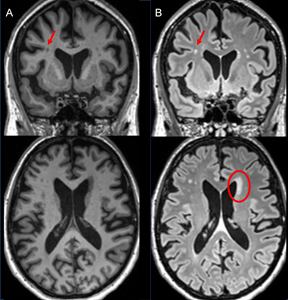Researchers from Indiana University School of Medicine received a grant from the National Institute on Aging to explore an area of the COVID-19 pandemic that connects endothelial cell dysfunction with intensive care unit (ICU) patients who develop delirium.
Between 5 to 8 percent of those infected with COVID-19 require hospitalization in an ICU due to severe symptoms. More than 80 percent of those COVID-19 ICU patients later develop delirium, an acute disorder of attention and cognition, which puts them at higher risk for mild cognitive impairment, Alzheimer’s disease or other related dementias.
Research shows that when endothelial cells—which line blood vessels and play a crucial role in the regulation of inflammation and blood coagulation—are infected with COVID-19, patients can develop acuate inflammation which can lead to blood clots throughout various organs in the body, including the brain.
“Currently, there’s a major gap in knowledge on whether this inflammation of endothelial cells plays a role in why patients experience delirium, leading to future development of brain disorders, like dementia,” said Sophia Wang, MD, MS, assistant professor of clinical psychiatry and principal investigator of the study.
Not only will this research aim to understand the connection between endothelial cell dysfunction and COVID-19 ICU patients who experience delirium, but it also seeks to identify novel therapeutic targets which will reduce the potential public health burden of ICU delirium, and subsequent Alzheimer’s disease and dementia, due to the COVID-19 pandemic.
Delirium affects more than 50 percent of all hospitalized older adults and costs the United States $152 billion annually. Patients who experience delirium are at higher risk to develop subsequent mild cognitive impairment or Alzheimer’s disease and other related dementias. However, despite the widespread impact of these disorders, it remains a mystery how delirium increases the risk for dementia.
With the additional stresses that the pandemic has added to the health care system the past two years, it’s more pertinent than ever to explore why COVID-19 ICU patients develop delirium or post-intensive care syndrome (PICS), health problems experienced after major illness. By examining both COVID-19 and non-COVID-19 ICU patients, Wang and her team will be able to properly identify the role that endothelial cells play in patients developing delirium and various brain disorders.
The grant, which was given to team of experts within the Department of Psychiatry, Department of Internal Medicine, the Indiana Alzheimer’s Disease Research Center and the Indiana University Center of Aging Research will support the groundwork for a future R01 proposal to provide necessary answers regarding the relationship between intensive care unit delirium and dementia, potentially leading to more advanced preventative treatment for both COVID-19 and Alzheimer’s disease. In addition to Wang, other members of this multidisciplinary team include Shannon Risacher, PhD, Babar Khan, MD, Fred Unverzagt, PhD, Matthias Clauss, PhD and Homer Twigg, MD.
Efforts like this further advance the school’s initiative to discover how to prevent and effectively treat Alzheimer’s disease, especially amid a global pandemic.
“If we can discover why these patients experience these symptoms, maybe we can not only prevent thousands of older adults from having delirium, but eventually developing dementia in the first place,” said Wang.
Learn more about Alzheimer’s disease at IU School of Medicine and explore new efforts that target interventions to reduce the public health burden of dementia.
Researchers explore the connection between endothelial cell dysfunction and delirium
Sonder Collins Feb 21, 2022

Sonder Collins
Having joined IU School of Medicine in 2016, Sonder uses a poetry and theatre background to bridge the academic world with the creative. A graduate of University of Evansville, he works with faculty, staff and trainees to create unique marketing ideas that connect the public to research, education and clinical initiatives taking place at IU School of Medicine. From writing stories on groundbreaking equipment to orchestrating digital marketing strategies, Sonder collaborates with experts across the school to help departments thrive in their marketing and communication ambitions. His specific area of focus is the Department of Radiology and Imaging Sciences and the Indiana Alzheimer's Disease Research Center.